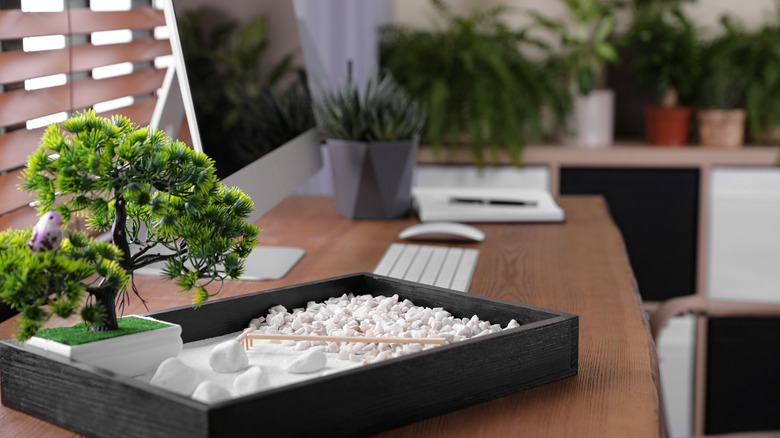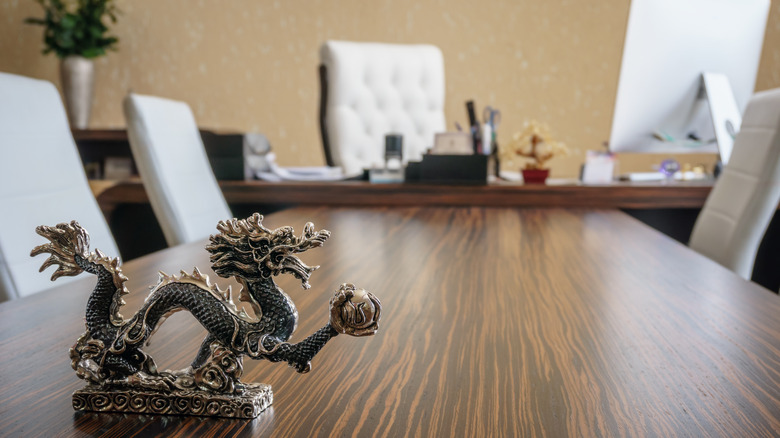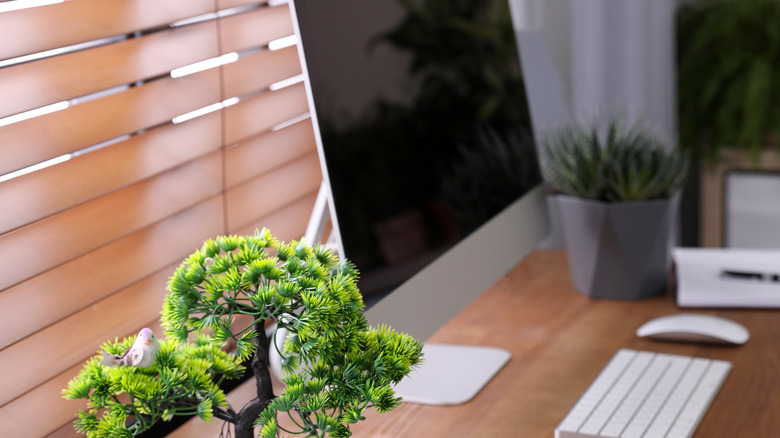How To Feng Shui Your Work Space For Optimal Productivity
Feng shui is an ancient art form that alters the way you interact with your space, home, and environment. Known for bringing peace and clarity to an individual, this practice works on aligning furniture and other items to create harmony for anyone who spends time in the area. It is based on the idea that nature and your living or working quarters should be equally balanced. According to National Geographic, channeling feng shui within a space will bring prosperity and inner calm.
Your office plays an important role in your daily life. Many people spend a lot of their lives within their workspace, so creating a harmonized, peaceful environment will make you more productive overall. National Geographic notes that the term feng shui translates to "the way of wind and water," and the idea behind this practice is based on balancing the yin and yangs of life. The idea of chi, a Taoist belief system, speaks about a life force which can be found in everything and everyone. By creating harmony and balance, a person can improve their life flow, giving them a healthier, happier, and more successful outlook. Arranging your office according to the feng shui principles can help you create a truly blissful space to undertake your work. Productivity will come easily, thanks to the positive effect feng shui has on your chi. These tips can help you properly channel this system and gain all the benefits it has to offer.
Find your desk's power position
One of the most important elements of a properly feng shui-styled office is the desk. According to Healthline, the optimal location for this piece of furniture is as far away from the door as you can get. You still want to be able to see the entrance to the room, but this spot is known as a position of power. It allows you to view the entire room, including the doorway where people enter through. Sitting diagonal or kitty-corner to the door means you are in a perfect feng shui location because you can view it without being in line with it.
Not all offices are set up to accommodate this placement, so you can also use mirrors to create a power position. In order to use a reflection to get a commanding angle, place it across from the desk or wherever it gives you a view of the doorway. This lets you see the entrance and keeps the feng shui flowing and aligned properly.
Your office chair is everything
Feng shui is about more than creating a good balance within a space. It is also about finding comfort in your surroundings, and when it comes to sitting at a desk, your chair should provide maximum comfort. Launch Workplaces recommends picking out an ergonomic chair that gives you a cozy place to work from while also providing support and stability to avoid injury. Chairs with higher backs are ideal for a good workflow and allow you to have a constant prop behind your spine to protect it. A higher-backed chair also creates an aura of protection for the person sitting in it, according to Healthline.
The positioning of your seat is important as well. When finding a place for everything, the desk chair should ideally sit up against a solid wall. As with the desk location, this might not always be feasible. If a wall isn't available, set up a border of thick, abundant plants right behind the chair. These act as a protective barrier, much as a wall would. Plants are extremely beneficial to the air you'll be breathing, so they technically serve two purposes in an office setting.
Organize your desk
Your desk is home to a variety of items, ranging from your computer and files to random trinkets that bring a personal touch. While having a sense of individuality and access to your items is important, it can make a space cluttered. Too much clutter leads to distraction and confusion, which negates the positive effects of feng shui. Launch Workplaces recommends having a surface that is 50% empty, so you have room to work and pursue creative endeavors. It is important to spread things out evenly on your desk too, rather than piling files or photos up on just one side. Feng shui is about balance, so using this thought process to organize your workspace will keep it in flow and easy to access.
Don't be afraid to have items on your desk, but make sure they are constantly being shifted or moved to avoid them becoming stagnant. Trinkets, photos, files, notepads, or other items that begin collecting dust are detrimental to a feng shui flow. Start every day by organizing and shifting things around to make room for incoming ideas or thoughts. Open up some space to work within, and keep it available throughout the day. This will allow you to harmonize with the rest of the room and feel productive.
Reference a Bagua Map
A Bagua Map is used in feng shui to help a person navigate the areas of their harmonized floor plan, per Go With Harmony. There are nine areas which include children, family, wealth, knowledge, career, fame, health, helpful people, and relationships. Health, or Thai Chi, goes in the middle, so it isn't counted within the areas for a floor plan but still requires attention. In this practice, a lifestyle circumstance such as wealth or family is represented by one of the eight areas on the map. Each one is represented by different colors, numbers, shapes, and elements from the earth.
When organizing your office, you can use this map to properly place everything from furniture to trinkets and decorations. Many people use this map throughout their homes to strategically place plants, lamps, couches, framed photos, and technology. You can also look to a Bagua Map for advice on how to set up your desk. According to Go With Harmony, relationships and children-related items should be placed on the right side of your desk when you are sitting at it. Career and fame-oriented items go directly in front and across from you, while knowledge, wealth, and family are placed to the left. Picking two or three areas to focus on in your office or on the desk will help you pinpoint which to spend time on since thinking about all of them at once can be overwhelming.
Focus on lighting and color
Incorporating the right lighting and color schemes is important to maintaining good feng shui in your office. If your space has a good amount of natural light, avoid blocking it with bigger items and instead let the sunshine flow into the room. Healthline recommends choosing lightbulbs that provide full-spectrum illumination over florescent lighting if natural light isn't an option. Even if you have a window but require a brighter space, opt for incandescent lamps or bulbs that won't bring on fatigue.
When it comes to painting your office, choose hues and tones that give off a soft feeling, like pale oranges, greens, and golds. Calming hues create a peaceful and serene environment, and those that look like they come from nature will help keep the flow of the room in sync. Because feng shui translates to water and wind, you can also opt for greenish-blue colors.
Bring in natural elements
Because feng shui focuses on the balance between nature and your world, having elements of the former will help provide a good chi. Place a fountain in your office space, letting the water bring in movement, calming sounds, and a flowing frequency. Plants help produce oxygen within an indoor space, improving air quality as you work. Dispense small succulents or other fauna around the room, filling several spaces with them to create balance. Make sure they are able to get some sunlight, be it direct or indirect, depending on their needs.
Plants also represent growth, which is perfect for inviting new opportunities and ideas into your space. According to Architectural Digest, some greenery can even counteract the negative energy caused by electromagnetic frequencies. Put plants like aloe vera next to your laptop or desktop to help filter out detrimental vibrations and replace them with positive ones.






